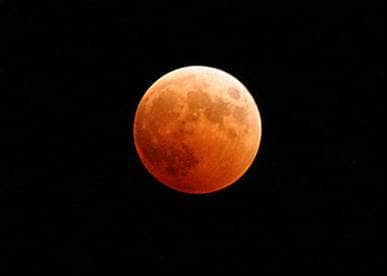
For as long as humans have been looking at the sky, Solar and Lunar Eclipses have always been a cause for wonder. There is something particularly awe-inspiring (and a little terrifying) about watching the Moon turn the color of blood during a Lunar Eclipse. Likewise, seeing the Sun go dark in the middle of the day is pretty startling too. It's no wonder that in Ancient China people used to bang on drums and make noise to scare off that dragon that was eating the sun.
Astrologers have traditionally seen eclipses as particularly portentous, and have often thought of them as a "bad omen." This sort of thing can be a double-edged sword for the modern astrologer: on the one hand, eclipses still get people's attention, and eclipses still tend to represent significant events in the lives of many. On the other hand, the modern astrologer is less likely to take the traditional "doom and gloom" approach to life. We all have a much better appreciation for the value of free will in our modern lives, and none of us wants to be told that the paths of the planets in the sky dictate our lives down to the finest detail.
We are currently beginning a cycle which is called a "lunar eclipse tetrad." That's where there is a series of four consecutive total lunar eclipses with six full moons in between them, and no partial lunar eclipses in between. There are some, most notably Pastor John Hagee, who are claiming that this heralds the apocalypse. Pastor Hagee is currently selling a lot of copies of his book "Four Blood Moons: Something Is About To Change." The premise of this book is based in large part in a reference in the Book of Revelations to "the moon turning to blood." I have written on the subject of astrology and the Bible before, and although I cannot describe myself as a biblical scholar, I can tell you that lunar eclipse cycles have lined up with Jewish feast days before, and if the world didn't end in 1494 or 1950, I figure it's not likely to end in 2015. Besides, Revelations also says the stars will be blacked out and/or fall to the Earth... and that's not how an eclipse works.
Nonetheless, Solar and Lunar eclipses are particularly powerful, and an astrologer ignores their effects at his or her peril. A Lunar Eclipse is also a Full Moon, and a Solar Eclipse is also a New Moon. The effects of the Full Moon on people's moods is well known, and the New Moon usually represents a new cycle in life. But when that Full or New Moon interacts with the Sun and Earth in such a way as to cause an eclipse, the regular effects of a Full or New Moon are greatly amplified.
Eclipses don't just affect individual lives; they also have a tendency to affect larger world events. Although when it's a Full Moon in your part of the world it's a Full Moon all over the Earth, eclipses leave a distinct and limited path: they project a shadow on a portion of the globe. Many astrologers have noticed the effects on world events within that shadow zone. For example, the last eclipse before the Prophet Mohammed was born shows the parts of the world where Islam is strongest.
Although the effects of an eclipse are often described as being sudden or unexpected, remember that no event in your life happens in a complete vacuum. Both astrology and life in general tend to give us some hints as to where the hammer will fall in advance. For example, an eclipse played a crucial role in the Democratic primaries when Hillary Clinton was upset by a relative unknown named Barack Obama... which came as a surprise unless you knew how to read the polling data in advance.
And finally… Don't forget some surprises are actually good, and that no matter what, you've already lived through a few eclipses in your time, and you'll likely make it through plenty more.
Visit Oh My Stars! to read more from Beliefnet astrology expert Matthew Currie.

